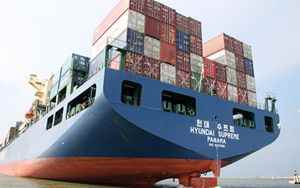(Finance) – The conflict in Ukraine will damage all segments of shipping as dramatic and volatile increases in the prices of commodities such as metals, wheat, oil and gas fuel global inflation and hold back demand, according to BIMCO, one of the largest international maritime associations representing shipowners. In particular, there will be no expected rebound in the market oil tankersas oil prices peaked in 13 years, as closed ports and record grain prices stifle demand for ships bulk carriersaid Niels Rasmussen, chief marine analyst at BIMCO.
In recent days, the largest merchant shipping companies in the world (Maersk, Ocean Network Express, Hapag Lloyd and MSC) announced that they have temporarily suspended all container shipments to and from Russia in response to Western sanctions against Moscow. The suspension does not include food, medical and humanitarian supplies. “The services are still operational and reservations for, for example, medical equipment and food will still be accepted,” said Lars Jensen, shipping expert and CEO of Vespucci Maritime. “This is essentially a way to mitigate the risks in the wider supply chain – he explained – The services for Russia are still operational, but if all the containers already on board the ships were suddenly interrupted they would be stuck in the main European hubs and they would aggravate the congestion problem“.
Maersk explained that the invasion of Ukraine is damaging global supply chains and increasing costs as transport routes are turned upside down, fuel prices soar and some carriers impose “war surcharges”. “The customs authorities of the European Union are standing inspecting all units to / from Russia in transit in their terminals / ports to identify sanctioned and restricted shipments, “Maersk told his customers.” This is a direct consequence of the sanctions, but there are also indirect impacts since all goods are delayed and our transhipment hubs become congestedimpacting our customers’ supply chains, ”the company added.
Other problems may soon come from shortage of merchant seamen to equip commercial ships, which would bring additional risks to global supply chains. According to data from the International Chamber of Shipping, there are approximately 1.89 million seafarers operating over 74,000 ships in the global merchant fleet. Of this total workforce, 198,123 (10.5%) are Russians, of which 71,652 are official and 126,471 are common. L’Ukraine it counts 76,442 (4%) seafarers, of which 47,058 officers and 29,383 municipalities. Together they therefore represent 14.5% of the global maritime workforce.
